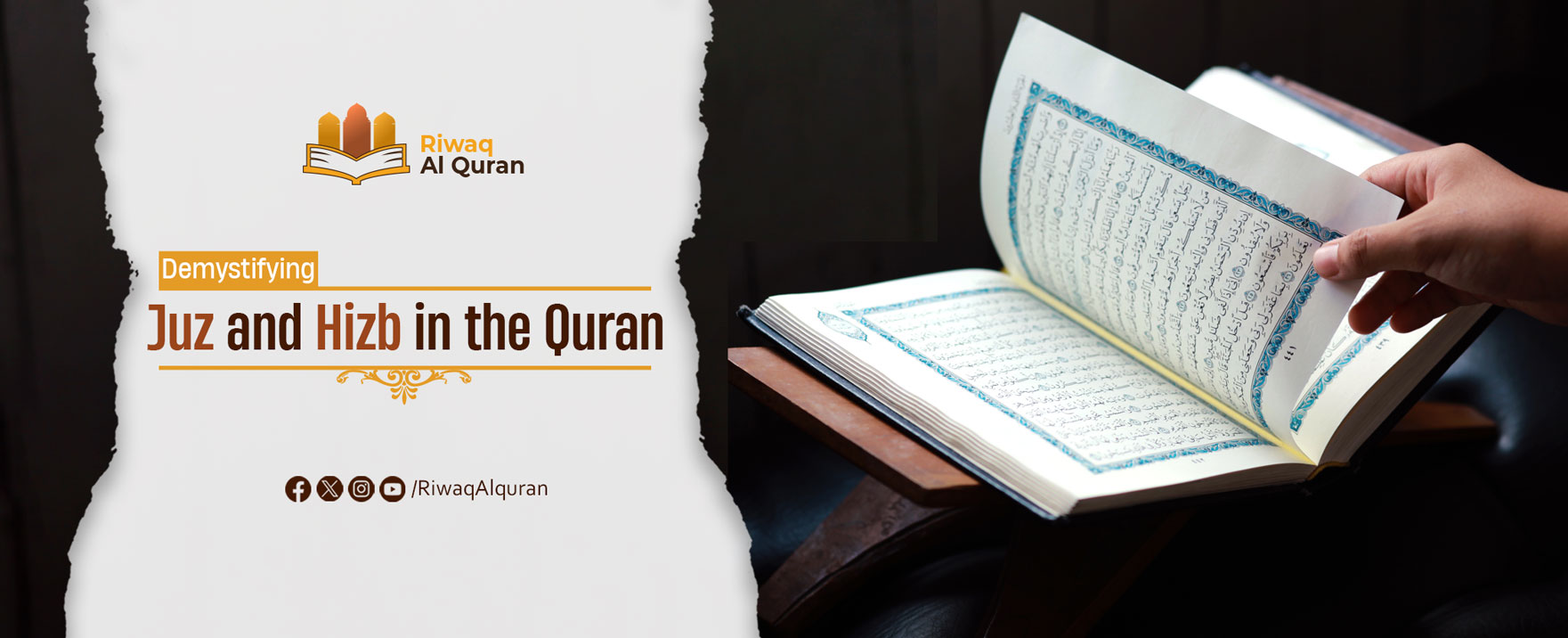When diving into the study and recitation of the Quran, two essential terms frequently appear: Juz and Hizb. Understanding these divisions is key to structured Quran memorization, daily recitation goals, and spiritual discipline—especially during Ramadan. But what exactly is the difference between a Juz and a Hizb?
Let’s break it down.
Table of Contents
What Is the Division of the Quran?
The division of the Quran into ajzaa’ (sing. juz’), ahzaab (sing. hizb), and arbaa‘ (sing. rub‘) is something that was developed and agreed upon later on by scholars and is based on their ijtihad.
It was developed by early Islamic scholars to make the text more accessible for recitation and study. Although not originally part of the Quranic text, these divisions have become an integral part of how the Quran is recited and memorized by Muslims around the world.
Introduction Between Juz and Hizb
While both Juz and Hizb serve to facilitate recitation, the Hizb is a smaller unit, allowing for even more precise and manageable daily recitation segments. The Hizb division also originates from early Islamic scholars who aimed to make the Quran accessible for daily reading and memorization.
There are 30 Juz in the Quran. Each Juz contains two Hizb, making it easier to divide the Quran into even smaller, more manageable portions.
There are 60 Hizb in the Quran. Each Hizb is half of a Juz, making it a more granular division that makes it easier for memorization portions and reflection.
Juz in the Quran
A Juz (Arabic: جزء) is one of thirty equal divisions of the Quran. Each Juz spans approximately 20 pages in the Madani Mushaf (the most commonly used script), written in the style of Uthman Taha. The division is practical—designed to make the Quran easier to recite or memorize daily, especially throughout Ramadan, when Muslims aim to complete the Quran in 30 days.
Key Facts About the Juz:
- Total: 30 Juz in the Quran
- Each Juz = 2 Hizb
- Originated for facilitating memorization and recitation
- Introduced by early scholars, not part of the original revelation
- May begin or end mid-surah, although some exceptions include full surahs
Popular Juz Examples:
- Juz Amma (30th Juz) – Begins with Surah An-Naba
- Juz Tabarak (29th Juz) – Begins with Surah Al-Mulk
- Juz Yaseen (23rd Juz) – Begins with Surah Ya-Sin
Each Juz is further divided into smaller sections to help with detailed recitation schedules.
Hizb in the Quran
A Hizb (Arabic: حزب) is a smaller unit of division, equal to half of a Juz. That means the entire Quran contains 60 Hizb.
The term “Hizb” literally means “section” or “portion” in Arabic, and its structure helps Muslims break down their daily Quran reading even further—for example, reciting one Hizb every day to finish the Quran in two months.
Each Hizb is Further Divided Into:
- 4 quarters (known as Rub‘ al-Hizb)
- Sometimes into 8 eighths (Thumn), especially in recitation methods like Qalun
This meticulous breakdown is especially useful for:
- Daily reading plans
- Memorization schedules
- Quran competitions and study groups
How Many Juz and Hizb Are in the Quran?
| Division | Total | Description |
|---|---|---|
| Juz | 30 | Major parts of the Quran |
| Hizb | 60 | Half-Juz sections for easier pacing |
| Rub‘ al-Hizb | 240 | Quarter sections within each Hizb |
Note: In earlier Islamic practice, the Quran was also divided into 7 thematic Hizb, allowing the companions of the Prophet ﷺ to complete the Quran once every week. These older divisions followed thematic breaks between surahs, not mathematical ones.
Difference Between Juz and Hizb
| Feature | Juz | Hizb |
|---|---|---|
| Definition | 1/30th of the Quran | 1/60th of the Quran |
| Total in Quran | 30 | 60 |
| Purpose | Recite Quran in a month | Finer pacing for reading |
| Further Split | Into 2 Hizbs | Into 4 quarters, sometimes 8 eighths |
| Size | About 20 pages | About 10 pages |
Why Are These Divisions Important?
The division into Juz and Hizb plays a vital role in how Muslims connect with the Quran consistently. Whether you’re planning to recite one Juz daily in Ramadan or one Hizb per week throughout the year, this structure supports:
- Spiritual discipline
- Daily habits of Quranic reflection
- Ease of memorization and revision
- Organized Quranic study programs
Importance and Goals of Juz and Hizb:
Have you ever asked why the Quran is divided into Juz and Hizb? These divisions aren’t random; they serve profound purposes that enhance our spiritual journey and make Quranic recitation more manageable. Let’s dive deep into the importance and goals of Juz and Hizb, unraveling their significance in the life of a Muslim.
1. Facilitating Daily Recitation
The division of the Quran into Juz and Hizb is a practical solution for daily recitation. For many Muslims, reciting one Juz each day ensures the completion of the entire Quran in 30 days, aligning perfectly with the 30 days of Ramadan.
This systematic approach makes it easier to maintain a consistent recitation habit without feeling overwhelmed. Smaller sections like Hizb make it easier to manage time, especially for busy individuals.
2. Enhancing Memorization
Memorizing the Quran is a noble goal for many Muslims, known as Hifz. The Juz and Hizb divisions play a critical role in this process. By breaking the Quran into manageable parts, memorization becomes less daunting and more structured.
3. Better for Reflection
Reading and understanding the Quran isn’t just about recitation; it’s about internalizing its teachings. The Juz and Hizb divisions encourage Muslims to reflect on smaller portions of the text, fostering a deeper spiritual connection.
4. Helps Imams In Prayer:
During Ramadan, the division into Juz helps imams lead Taraweeh prayers effectively, ensuring the entire Quran is recited by the end of the month to make the most of it since Ramadan is the month of the Quran.


Join Riwaq Al Quran and Start This Rewarding Journey!
If you’re seeking personalized guidance in your Quranic journey, consider enrolling in Riwaq Al Quran’s teaching academy. Our expert tutors offer tailored online Quran learning courses that cater to your individual pace and needs, ensuring you achieve proficiency in recitation, memorization, and understanding of the Quran. Start your spiritual journey with Riwaq Al Quran today!
We offer several courses such as:
- Online courses for kids.
- Online Quran classes for kids and adults.
- Online Arabic courses
- Online Ijazah courses
- Online Islamic Studies courses.
Conclusion:
Understanding the difference between Juz and Hizb helps Muslims organize their Quranic journey with clarity and purpose. While a Juz is a larger section meant for monthly completion, a Hizb allows for more granular pacing—perfect for daily reflection, memorization, or learning Tajweed.
Whether you’re a beginner, a parent teaching your children, or an advanced student pursuing an Ijazah, these divisions provide the scaffolding to stay consistent and spiritually connected to the Book of Allah.
Want to make your Quran recitation consistent and effective? Join Riwaq Al Quran’s customized programs and start mastering the Quran, one Hizb at a time.


































